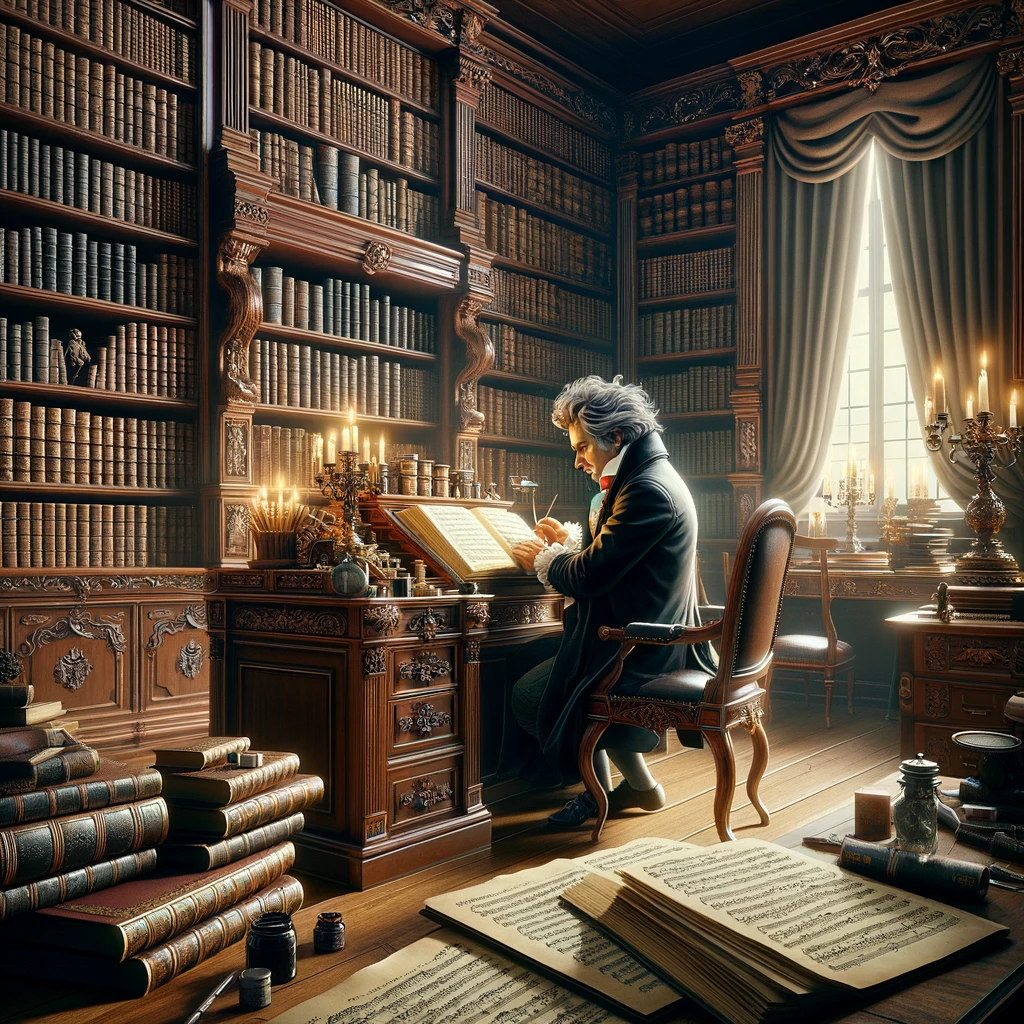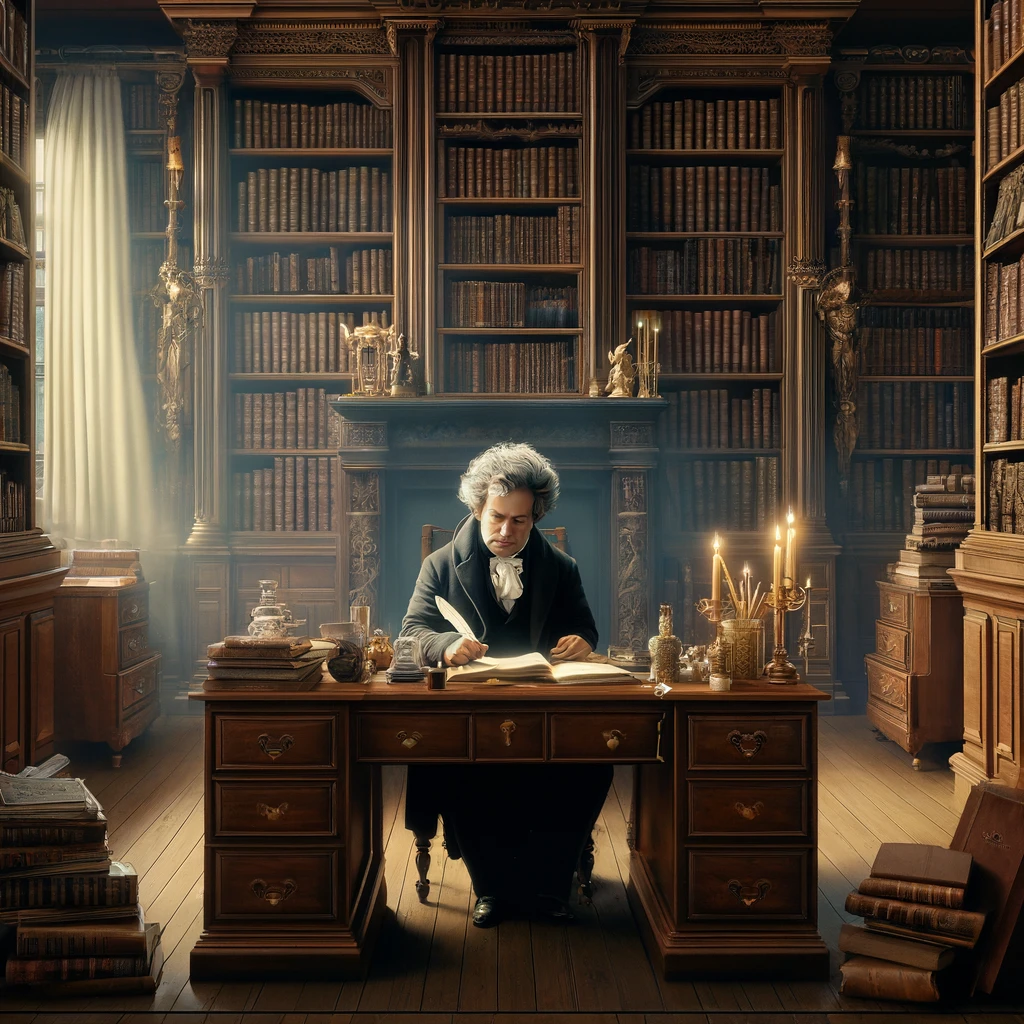
Beethoven’s Personal Library: A Unique Insight
Ludwig van Beethoven, a titan of classical music, is universally recognized for his profound contributions to the symphony, sonata, and quartet. However, less known is how the literature he engaged with shaped his revolutionary compositions. Beethoven’s personal library offers a fascinating lens through which to view the intellectual currents that influenced his creative process.
The Intellectual Influences on Beethoven
Beethoven lived during the Enlightenment and the Romantic era, periods ripe with ideas that undoubtedly influenced his compositions. His library was filled with works spanning literature, philosophy, theology, and the natural sciences. Understanding the books Beethoven read opens a new perspective on how he thought and composed.
The Breadth of His Collection
Beethoven’s collection was eclectic. He owned works by ancient philosophers like Plato and modern thinkers of his time such as Kant and Schiller. His affinity for literary works was not merely superficial; it was deeply interwoven with his musical creativity. For instance, his love for the works of Homer is well-documented, with the “Iliad” and the “Odyssey” having pride of place on his shelves. These epic poems, full of dramatic themes and heroic narratives, echo in the grandeur and intensity of his music.
Plutarch’s “Lives” was another staple, suggesting that Beethoven drew inspiration from the biographies of great men and women, perhaps seeing parallels in the struggles and triumphs of historical figures with his own personal and artistic challenges. This connection may be seen in the heroic and triumphant motifs prevalent in his compositions such as the “Eroica” Symphony, dedicated originally to Napoleon Bonaparte, whom Beethoven initially admired as a democratic reformer.
Philosophical and Poetic Inspirations
The philosophy of Immanuel Kant, with its emphasis on duty and moral imperatives, resonated with Beethoven, whose music often grapples with themes of fate and human destiny. This philosophical influence is particularly evident in his late string quartets, where the music ventures into complex, introspective, and often transcendent territories.
The poetic works of Friedrich Schiller, especially “An die Freude” (Ode to Joy), famously set to music in the final movement of the Ninth Symphony, also featured in Beethoven’s library. Schiller’s ideals of freedom, joy, and brotherhood deeply moved Beethoven and shaped some of his most memorable compositions.
The Role of Religious Texts
Beethoven’s collection included several theological works, reflecting his complex relationship with spirituality. He was particularly taken with the writings of theologian Emanuel Swedenborg, whose works propose that music is a central force in the spiritual order of the universe. Such ideas may have influenced Beethoven’s integration of spiritual and ethical dimensions in his music, aiming to uplift and educate rather than merely entertain.
Scientific Curiosity
Not confined to artistic and philosophical texts, his library also contained books on natural sciences, reflecting his profound curiosity about the world. Beethoven was interested in the works of physicist and astronomer Johann Heinrich Lambert, and such scientific inquiry may have inspired the structural and mathematical precision found in his music compositions.
Beethoven’s personal library was more than just a collection of books; it was a source of intellectual stimulation and artistic inspiration. The themes found in his chosen literature—heroism, morality, joy, freedom, and spiritual contemplation—are recurrent in his musical oeuvre, suggesting a deep, intrinsic connection between his reading habits and his revolutionary approach to music. Understanding the contents of Beethoven’s library gives us richer insight into the mind of a genius, revealing that his achievements were not only due to his extraordinary musical talent but also his relentless pursuit of knowledge across disciplines.
Beethoven’s intellectual pursuits remind us that the arts and humanities are deeply interconnected, each informing and enriching the other. His library allows us a glimpse into the personal world of a musical giant, showing us how a diverse intellectual palette can fuel creative genius and lead to timeless art that resonates through ages.

Beethoven’s Reading on Nature and Human Emotion
In exploring the depths of Beethoven’s library, one finds a striking connection between his reading choices and his musical portrayal of nature. His admiration for pastoral scenes, as beautifully illustrated in the Sixth Symphony, “Pastoral,” may have been influenced by his readings on natural history and the philosophical reflections on nature by Rousseau, whose ideas on the intrinsic value of nature were quite popular at the time. Rousseau advocated for the emotional and spiritual healing powers of nature, a theme that resonates through Beethoven’s work, which often transcends the mere representation of landscapes to express profound philosophical ideas.
The Impact of Literary Characters and Narratives
Among the literary figures, Shakespeare was another giant whose works Beethoven cherished. The emotional depth, dramatic intensity, and complexity of Shakespeare’s characters found echoes in Beethoven’s musical dramas. Pieces like the “Coriolan Overture” directly reflect the tragic struggle of Shakespeare’s hero Coriolanus, embodying the conflict and resolution characteristic of dramatic narrative in a purely musical form.
Reading for Personal Resilience
The impact of these books on Beethoven was not just intellectual or artistic but also deeply personal. Battling severe health issues, including his well-known deafness, Beethoven found solace and strength in his books. They were his companions in solitude, his consolation in despair, and his reinforcement in perseverance. This personal engagement with his reading material might explain the profound emotional depth and resilience evident in works like his late piano sonatas and string quartets.
Influence of Political Thought
Beethoven’s engagement with political philosophy, particularly the writings of Enlightenment thinkers like Voltaire and Rousseau, also shaped his views on society and governance, which subtly permeated his music. His “Fidelio,” an opera that deals with themes of justice, sacrifice, and freedom, reflects his political convictions about the tyranny and the valor of personal sacrifice for a greater good.
Reflections on Musical Structure from His Readings
The influence of Beethoven’s readings on his compositional technique can also be seen in his approach to musical structure and form. The architectural and organizational principles in the works of Vitruvius, an ancient Roman architect whose ideas were revived during the Renaissance, may have inspired Beethoven’s methodical approach to constructing his symphonies and sonatas. The clarity, balance, and proportion in his music bear a resemblance to architectural principles, suggesting a scholarly underpinning to his intuitive genius.
Legacy of Beethoven’s Intellectual Pursuits
Understanding Beethoven’s reading habits helps illuminate how his intellectual pursuits bled into his music, enriching his compositions with layers of meaning and emotion. His library was not merely a reflection of his intellectual interests but a toolbox that equipped him to break new ground in music, pushing the boundaries of what was possible in his art form. Beethoven’s broad intellectual curiosity and diverse literary tastes helped forge his path as a pioneering composer, whose works continue to challenge and inspire.
Beethoven’s personal library reveals a man who was not only a composer but a thinker deeply engaged with the cultural and intellectual currents of his time. His story is a testament to the power of interdisciplinary learning and its potential to elevate artistic expression. In studying his library, we not only uncover new dimensions of Beethoven’s genius but also reaffirm the timeless value of connecting diverse fields of knowledge through the arts.